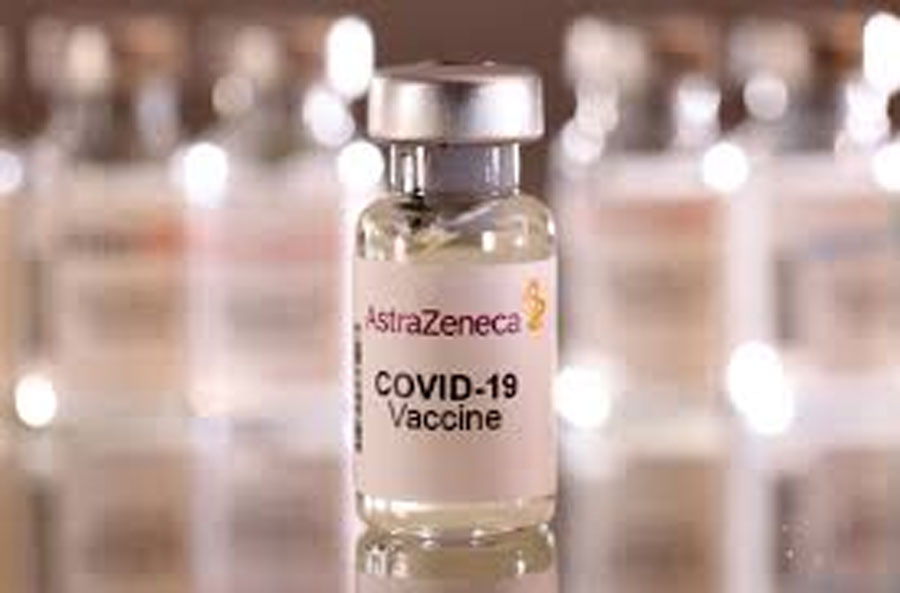Bangladesh health minister orders investigation into side effects of AstraZeneca COVID vaccine
But he says they will not withdraw the COVID vaccine until such evidence is found

Published :
Updated :

Health Minister Samanta Lal Sen has instructed the Health Directorate to investigate whether any recipients of the Oxford-AstraZeneca COVID vaccine in Bangladesh have experienced side effects.
“If any evidence of side effects is found, those vaccines will not be administered. However, we will not withdraw this vaccine until such evidence is found,” he said amid lawsuits and discussions about withdrawing the Covishield and Vaxzevria vaccines, products of AstraZeneca, from the global market.
After an event at Dhaka’s CIRDAP Auditorium on Wednesday, the minister said he had heard about side effects from these vaccines but no such reports have been found in Bangladesh.
“I have instructed the DG Health to conduct a survey on those who have been vaccinated and report back to me,” before reiterating, “we will not withdraw the vaccine until we find evidence.”
During the COVID-19 pandemic, the Covishield and Vaxzevria vaccines, developed by the British-Swedish company AstraZeneca and Oxford University, were administered worldwide.
Covishield was produced by India’s Serum Institute, while the same vaccine is known as Vaxzevria in Europe.
Vaccinations in Bangladesh began on Feb 8, 2021, initially with AstraZeneca’s vaccine, followed by purchases of Sinopharm from China and Moderna from COVAX. The elderly received the Pfizer vaccine as their fourth dose.
According to the Health Directorate, more than 159 million first doses have been administered, over 142 million people have received their second dose, over 68 million have received their third dose, and over 5.14 million have received their fourth dose.
Of these, the highest number - 207.676 million doses - were of the AstraZeneca vaccine.
Reports of side effects such as blood clotting and a drop in platelet counts have been received, which the authorities later acknowledged.
Lawsuits are ongoing in the UK against AstraZeneca, claiming compensation of 100 million pounds due to deaths and complications from vaccine side effects.
In February, a court there heard that in very rare cases, the Covishield vaccine could cause ‘TTS’ or ‘Thrombosis with Thrombocytopenia Syndrome’.
Amid these discussions, on Tuesday, AstraZeneca announced the withdrawal of the COVID vaccine from the global market due to the emergence of new variants and the availability of updated vaccines reducing demand.
However, Health Minister Sen said that the decision to withdraw the vaccine from Bangladesh will be based on verification of side effects.
He participated in a meeting organised by the ‘Bangladesh Parliamentary Forum for Health and Wellbeing’ to strengthen the vaccination programme and ensure universal health care.
Sen said, “The vaccination program has achieved remarkable success thanks to Prime Minister Sheikh Hasina, who has been honoured with the title of ‘Vaccine Hero’.
“Despite a shortage of manpower, workers across the country are tirelessly implementing the vaccination programme. Necessary initiatives will be taken soon to overcome this manpower crisis.”
The minister also mentioned measures being taken to prevent dengue, ensuring that no shortage of equipment occurs and prices do not increase.
However, he emphasised that controlling dengue primarily requires mosquito eradication.
“To control dengue, two ministries must work together. If we do not reduce the source of dengue, simply building more hospitals will not suffice.”
The meeting was attended by Professor Md Abdul Aziz, Md Siddiqur Rahman Patwary, Nadia Binte Amin, Farida Yasmin, Anima Mukti Gomez, Kanan Ara Begum, Jarati Tanchangya, UNICEF Bangladesh’s Chief of Health Maya Van Den Ent, WHO representative Dr Bardan Jung Rana, and the Additional Director General of the Health Directorate, Prof Ahmedul Kabir.


 For all latest news, follow The Financial Express Google News channel.
For all latest news, follow The Financial Express Google News channel.